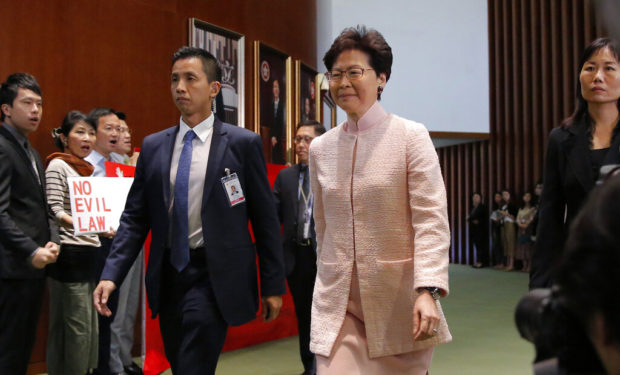Hong Kong proposes safeguards to extradition law amendments

In this May 22, 2019 file photo, Hong Kong Chief Executive Carrie Lam (center) arrives for a meeting at the Legislative Council as the pro-democracy lawmakers chant placard and banner against the new extradition law in Hong Kong. AP
HONG KONG — Hong Kong’s government said Monday that it was willing to raise the threshold for extraditing criminal suspects amid widespread concerns over moves seen as eroding the territory’s independent legal system.
The proposals announced in a government news release Monday appear to be an attempt to assuage critics from the business and legal sectors, as well human rights and pro-democracy activists who have long opposed proposed amendments to the extradition law.
The amendments have been criticized as making it easier to send criminal suspects to mainland China, where they could face vague national security charges and unfair trials. Chinese President Xi Jinping has been seen as extending his crackdown on civil liberties to Hong Kong, threatening the territory’s promised semi-autonomy.
Monday’s news release said additional safeguards in the amendments would include a requirement that extradition be permitted only for offenses punishable with prison sentences of seven years or more, rather than three years as before.
Governments requesting extradition would also have to provide assurances that the suspects would receive protections including the presumption of innocence, the right to an open trial, legal representation, the right to cross-examine witnesses, freedom from coerced confessions and the right to appeal. They must also show that the statute of limitations has not expired.
Requests for extradition would only be processed if they come from a central authority such as China’s Supreme People’s Procuratorate, rather from a provincial or other local authority. The territory should also explore helping sentenced people serve their sentences in Hong Kong and negotiate arrangements for post-surrender visits by consuls or other officials, the government said.
Hong Kong Chief Executive Carrie Lam has “reflected the concerns of Hong Kong society to the Central People’s Government (CPG), which expressed understanding and will respect and support the (Hong Kong government’s) various measures to take further measures to enhance protections and allay public concerns,” the news release said.
Hong Kong was guaranteed the right to retain its own social, legal and political systems for 50 years following its handover from British to Chinese rule in 1997, the so-called “one country, two systems” framework. However, China’s ruling Communist Party has been seen as increasingly reneging on that agreement by forcing through unpopular legal changes.
Hong Kong’s Legislative Council intends to vote on the amended Fugitive Offenders Ordinance and the Mutual Legal Assistance in Criminal Matters Ordinance on June 12.
Another massive march and rally against the amendments is scheduled for Sunday.
Hong Kong currently limits such extraditions to jurisdictions with which it has existing extradition agreements or to others on an individual basis under a law passed before 1997.
China was excluded because of concerns over its poor record on legal independence and human rights. In recent years, mainland authorities have gone after opponents by accusing them of dubious crimes such as tax evasion, crystalizing worries among critics and others.
Lam’s government argued the revisions were needed to close legal loopholes, while opponents say that is merely an excuse to pursue China’s agenda of reducing Hong Kong’s legal independence. /ee